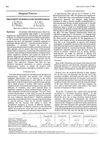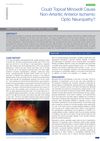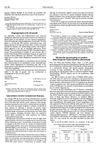 35 citations,
July 1981 in “Clinical Pharmacology & Therapeutics”
35 citations,
July 1981 in “Clinical Pharmacology & Therapeutics” Minoxidil can cause dangerous fluid buildup around the heart.
 October 2015 in “Elsevier eBooks”
October 2015 in “Elsevier eBooks” Minoxidil is effective for hair growth and safe for long-term use.
 61 citations,
March 1981 in “Circulation”
61 citations,
March 1981 in “Circulation” Minoxidil improves blood flow in heart failure patients.
 28 citations,
January 1989 in “Toxicologic Pathology”
28 citations,
January 1989 in “Toxicologic Pathology” Minoxidil may cause heart changes; use caution and monitor patients with heart conditions.
 11 citations,
April 2009 in “Pharmacotherapy”
11 citations,
April 2009 in “Pharmacotherapy” Minoxidil can cause deadly skin reaction; monitor patients closely.
 11 citations,
January 1980 in “Southern Medical Journal”
11 citations,
January 1980 in “Southern Medical Journal” Minoxidil effectively treats severe hypertension but has notable side effects.
 5 citations,
August 2021 in “Journal of The European Academy of Dermatology and Venereology”
5 citations,
August 2021 in “Journal of The European Academy of Dermatology and Venereology” Sublingual minoxidil safely promotes hair growth.
 121 citations,
March 1989 in “Journal of Investigative Dermatology”
121 citations,
March 1989 in “Journal of Investigative Dermatology” Minoxidil can help grow hair in mice by making cells grow and improving hair quality. More research needed.
 80 citations,
September 1984 in “Journal of The American Academy of Dermatology”
80 citations,
September 1984 in “Journal of The American Academy of Dermatology” 5% minoxidil helps hair regrowth in androgenic alopecia.
 51 citations,
April 1982 in “Lancet”
51 citations,
April 1982 in “Lancet” Most patients with hard-to-treat high blood pressure can be managed effectively with various treatments, but no single treatment is perfect.
 49 citations,
July 2009 in “Journal of the American Academy of Dermatology”
49 citations,
July 2009 in “Journal of the American Academy of Dermatology” Some people experienced hair loss after mesotherapy treatments for hair loss.
 45 citations,
November 1979 in “British Journal of Dermatology”
45 citations,
November 1979 in “British Journal of Dermatology” Minoxidil causes excessive hair growth in almost all patients.
 37 citations,
January 1987 in “Dermatology”
37 citations,
January 1987 in “Dermatology” Minoxidil stimulates hair growth by increasing hair thickness and prolonging growth phase.
 25 citations,
May 2014 in “Facial Plastic Surgery”
25 citations,
May 2014 in “Facial Plastic Surgery” PRFM may help treat hair loss, especially in mild cases.
 24 citations,
September 2020 in “Dermatology and therapy”
24 citations,
September 2020 in “Dermatology and therapy” Oral minoxidil 5 mg daily increases hair growth safely in men with hair loss, with minor side effects.
 23 citations,
January 2016 in “Transgender health”
23 citations,
January 2016 in “Transgender health” Hormone therapy with estradiol and spironolactone can regrow scalp hair in transgender women by lowering testosterone to female levels.
 21 citations,
October 1978 in “The Journal of Clinical Pharmacology”
21 citations,
October 1978 in “The Journal of Clinical Pharmacology”  8 citations,
October 2015 in “Asian Journal of Chemistry”
8 citations,
October 2015 in “Asian Journal of Chemistry” A new method was created to accurately measure minoxidil and aminexil in hair loss treatments.
 6 citations,
January 2016 in “Journal of Clinical and Diagnostic Research”
6 citations,
January 2016 in “Journal of Clinical and Diagnostic Research” Topical minoxidil might potentially cause vision problems, but more research is needed.
 3 citations,
January 2019
3 citations,
January 2019 Amla oil may help treat hair loss.
 1 citations,
June 2013 in “Science-business Exchange”
1 citations,
June 2013 in “Science-business Exchange” Increasing the levels of a protein called FGF9 can promote hair growth, but humans may not respond the same way due to a lack of certain cells.
 1 citations,
January 2010
1 citations,
January 2010 Mesotherapy is more effective than topical spray for female hair loss treatment.
 1 citations,
October 1990 in “The Lancet”
1 citations,
October 1990 in “The Lancet” Using minoxidil for hair growth may cause skin lesions in some people, and taking breaks from nitrate patches for angina might worsen symptoms.

Ingesting minoxidil can cause serious heart problems and requires urgent medical treatment.
 December 2022 in “Proceeding Bengkulu International Conference on Health”
December 2022 in “Proceeding Bengkulu International Conference on Health” Celery extract hair gel at 5% concentration is best for making hair gel.
 April 2014 in “Journal of Aesthetic Nursing”
April 2014 in “Journal of Aesthetic Nursing” Mesotherapy with natural extracts and vitamins can improve hair loss and promote regrowth in most women.
 November 2011 in “Australasian Journal of Dermatology”
November 2011 in “Australasian Journal of Dermatology” Cellulite may be linked to low adiponectin, isotretinoin with UVB can treat psoriasis effectively, permanent alopecia post-chemotherapy resembles a unique hair loss, deodorants may cause fragrance allergies, desmoplastic melanoma is becoming more common, and intensive UVB treatment can give long-term psoriasis remission.
 349 citations,
January 2005 in “The FASEB journal”
349 citations,
January 2005 in “The FASEB journal” Human skin can make serotonin and melatonin, which help protect and maintain it.
 180 citations,
January 2003 in “American Journal of Clinical Dermatology”
180 citations,
January 2003 in “American Journal of Clinical Dermatology” Menopause can lead to skin and hair problems due to hormonal changes, but hormone replacement therapy might help slow these effects.
 138 citations,
August 1985 in “Journal of The American Academy of Dermatology”
138 citations,
August 1985 in “Journal of The American Academy of Dermatology” Minoxidil promotes hair growth in male pattern baldness.






























